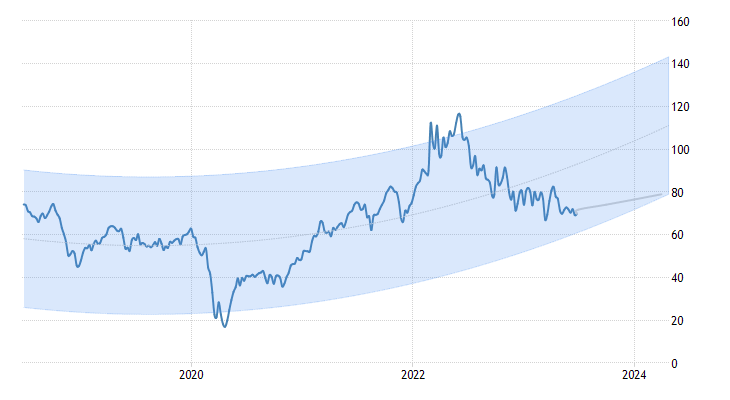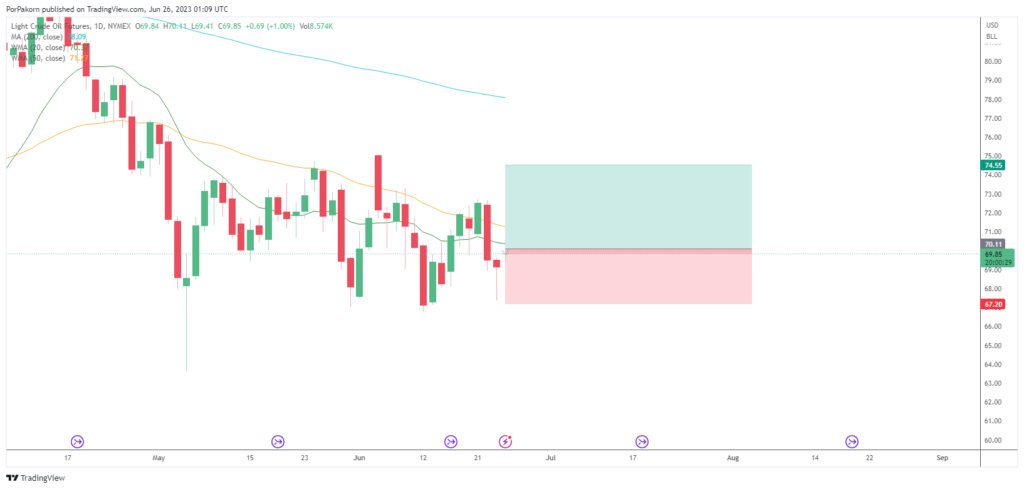Introduction:
The global oil market is experiencing volatility and uncertainty due to political unrest and economic slowdown. Oil Trade signal and WTI crude futures surged over 1%, reaching around $70 per barrel on Monday. This increase was driven by a brief rebellion faced by a private military group in Russia, raising concerns about political instability in one of the world’s largest oil producers. The emergence of the paramilitary group Wagner, which advanced towards Moscow before retreating after striking a deal with the Russian government, adds complexity to the situation. Russia’s role as a significant oil supplier to Asian countries like China and India makes any disruption in its supply chain a cause for concern. In contrast, the US oil benchmark witnessed a sharp decline of nearly 4% last week, influenced by monetary tightening, hawkish messaging from major central banks, and discouraging PMI data from advanced economies, indicating a slowdown in manufacturing.

Political Unrest and Supply Concerns: oil Trade signal
The recent rebellion by a private military group in Russia has sent shockwaves through the global oil market, raising questions about the stability of a major oil-producing nation. Russia plays a crucial role in the oil trade, especially for Asian countries heavily reliant on its discounted oil offerings, such as China and India. The emergence and subsequent retreat of the paramilitary group Wagner, following negotiations with the Russian government, raise concerns about potential disruptions in the oil supply chain. Such disruptions can have cascading effects on the global economy, leading to higher energy prices and impacting emerging economies grappling with rising fuel costs. Consequently, oil trade signals are under scrutiny as any signs of further political instability in Russia could exacerbate supply concerns and trigger market volatility.
Economic Slowdown and Oil Demand:
Oil Trade signal The recent decline in the US oil benchmark, coupled with discouraging PMI data from advanced economies, paints a bleak picture of the global economy and raises doubts about future energy demand. Major central banks’ monetary tightening measures have increased borrowing costs, dampening economic activity and denting market sentiment. This directly affects the demand for oil and its derivatives, as manufacturing and services activities experience a significant slowdown. The interplay between political unrest and economic slowdown holds immense significance in shaping the global oil trade signal. Market participants must closely monitor these indicators and adjust their strategies accordingly, as a prolonged economic downturn can have far-reaching consequences in the energy sector and reshape market dynamics.

Implications for Investors and Traders: oil Trade signal
Given the current landscape of political instability and economic uncertainty, investors and traders in the oil market need to exercise caution and adapt to evolving dynamics. Monitoring oil trade signals becomes paramount to making informed decisions and mitigating risks. While disruptions in the oil supply chain may create short-term price fluctuations, they also present unique opportunities for astute market participants. The volatility generated by political unrest can create favorable entry points for investors looking to build positions in the oil market. Similarly, traders can leverage their understanding of the interplay between economic indicators and oil demand to identify potential trends and execute profitable trades. Employing a comprehensive approach that includes staying informed about geopolitical developments impacting oil-producing regions and monitoring economic indicators influencing energy demand is essential to navigating current market conditions effectively.

Conclusion:
In conclusion, oil Trade signal the global oil market is at a critical juncture, with political unrest and economic slowdown exerting significant influence. The recent rebellion by a private military group in Russia has raised concerns about supply disruptions in one of the world’s largest oil-producing nations. Concurrently, an economic slowdown, characterized by declining manufacturing and services activities, has dampened energy demand. The interplay between these factors underscores the importance of closely monitoring oil trade signals to make informed decisions and adapt to evolving market dynamics. This period of volatility and uncertainty presents both challenges and opportunities for investors and traders. By staying abreast of geopolitical developments, understanding economic indicators, and employing effective risk management strategies, market participants can position themselves advantageously and navigate the ever-changing landscape of the global oil trade.






I don’t think the title of your article matches the content lol. Just kidding, mainly because I had some doubts after reading the article.
I will right away grab your rss as I can’t find your email subscription link or e-newsletter service. Do you’ve any? Please let me know in order that I could subscribe. Thanks.